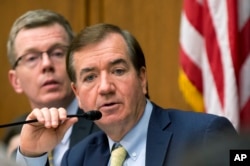Strengthened U.S. sanctions that would intensify financial pressures on North Korea advanced one step closer to becoming law Tuesday.
The House of Representatives passed legislation by a special majority vote that would support the Trump administration's calls for a tougher approach to the North Korean regime.
"This legislation gives the administration powerful new tools to protect the U.S. and our allies from the threat of North Korean nuclear missiles by going after those who enable the regime's aggression," said House Foreign Affairs Chair Ed Royce, the bill's co-sponsor.
"This shows the world that Congress stands ready to help the administration work with our allies and others to counter the North Koreans' belligerent behavior," added the California Republican.
Sanctions in bill
The sanctions would increase North Korea's financial isolation, targeting countries engaged in arms trade with North Korea and restricting the hard currency the regime earns through forced labor abroad. The bill would also require the Trump administration to determine within 90 days whether the government of North Korea should be redesignated as a state sponsor of terrorism.
The House action on sanctions follows weeks of increasing regional tensions, as President Donald Trump called for a more aggressive security posture in response to North Korean leader Kim Jong Un's repeated missile tests as he tries to build up the country's nuclear program.
Last Friday, Secretary of State Rex Tillerson led a special United Nations Security Council meeting focused on strengthening sanctions against the regime.
Royce praised Tillerson's "strategy of maximum pressure" against North Korea during debate on the House floor Tuesday afternoon.
The bill garnered rare bipartisan support on Capitol Hill, with both Republican and Democratic members of the House Foreign Affairs Committee warning that North Korea's repeated missile tests advance its intercontinental striking capabilities.
But some Democratic members of the committee expressed concern about what they said was Trump's inconsistent approach to North Korea.
"There's plenty of blame to go around for how we got here," said Representative Eliot Engel, the ranking Democratic member on the Foreign Affairs Committee, referring to attempts by previous U.S. presidents to address the North Korean threat.
"However, I fear the administration's inconsistency in recent weeks has thrown fuel to the fire," Engel said. "We're sending mixed signals and the world is taking notice. Inconsistency on national security matters is not a foreign policy strategy that will succeed."
Mixed signals
Trump called Kim a "pretty smart cookie" Monday, saying he would be willing to meet with the North Korean leader under the appropriate circumstances. The administration has also sent mixed signals in negotiations with ally South Korea, and with a confusing claim that a U.S. aircraft carrier had been sent to the region.
But a classified administration briefing on North Korea last week drew bipartisan praise from House members, with many urging the White House to increase diplomatic pressure on China to assure regional security.
"The time has come to tighten the noose on little Kim," said Representative Ted Poe, a Republican from Texas who chairs the House Foreign Affairs terrorism, nonproliferation and trade subcommittee. "We have to choke off the sources of his ill-gotten gains, and these sanctions do that."
The bill now moves to the Senate, where it is expected to pass.






